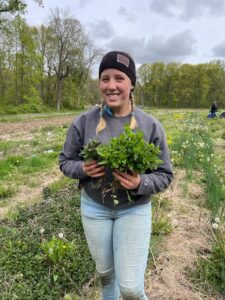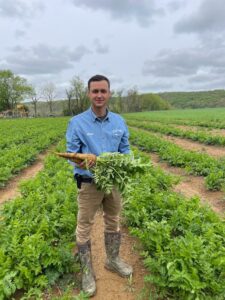Four-Season Farming
Four-Season Farming
Early Harvesting We are enjoying an early harvest this year due to our practice of over-wintering. You may have seen select crops in the ground during the winter months and wondered if these are forgotten or intentional. These crops are deliberately planned by our farm production team and illustrate overwintering, an age-old custom of leaving… Read More »

We are enjoying an early harvest this year due to our practice of over-wintering. You may have seen select crops in the ground during the winter months and wondered if these are forgotten or intentional. These crops are deliberately planned by our farm production team and illustrate overwintering, an age-old custom of leaving vegetables in the ground during winter months. This technique provides many benefits, including the ability to reap an early harvest, lengthen our harvest window, and ensure crop cover for the fields. Cover crops provide so many benefits including keeping nutrients in the soil, while also aiding in soil, and water conservation by reducing runoff. Cover crops also trap nitrogen in the soil allowing us to reuse it to feed crops.
How Sweet It Is
Certain crops are ideal candidates for overwintering on our farm and in your home garden. Brassicas and certain herbs, 
Growing Healthy Soil
These crops are planted in late summer, typically around labor day, and allowed to winter over. No covering is required or special treatment. All that is recommended is to ensure that you have healthy, well-drained soil. Healthy soil allows water to percolate, improving drainage and reducing wet site conditions. We are sure to incorporate mulch and other organic matter several times a year to improve soil structure. You can learn more about other methods we use to grow healthy soil here. Watch a fun video about the process of nourishing the soil by clicking here.
You can partake in four-season gardening at home, as we do on our farm, to enjoy an early harvest and a healthy backyard ecosystem. For more information and help in starting your vegetable garden visit Rutgers Cooperative Extension.







